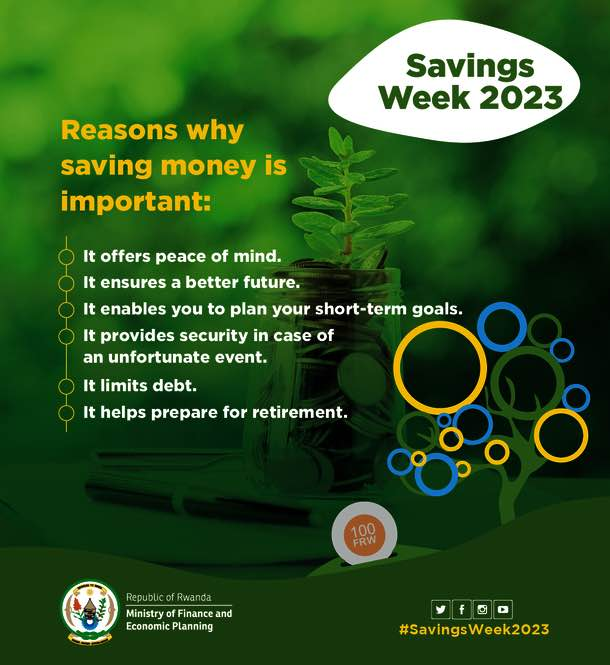
Rwanda joined the rest of the world to celebrate the World Savings Day, which is meant to increase public awareness of the importance of saving.
Every year since 2009, prior to the World Savings Day, Rwanda conducts a savings week awareness campaign aimed at promoting the culture of savings. The week brings together stakeholders including government, financial institutions, private sector as well as non-governmental organizations who actively participate in activities aimed at creating more awareness about savings.
The 2023 savings week was held under the theme “Your savings, your sustainable growth”, aimed at encouraging Rwandans to embrace the savings culture as a sure way to financial freedom.
“Savings are the lifeblood for an individual, a company or an economy during times of uncertainties. The outbreak of Covid-19 pandemic and subsequent economic shocks have provided us with a powerful lesson on the importance of saving. We encourage Rwandans to embrace the culture of saving as it will provide them with financial security, freedom and opportunity to enjoy quality life,” Dr. Uzziel Ndagijimana, the Minister of Finance and Economic Planning said.
According to the current figures, savings as a percentage of GDP stood at 15% in 2021 from 8% of GDP in 2015. This is a slight reduction to 14% registered in 2022. The dip is attributed to low savings culture, low income, high standards of living and inflation.
Rwanda seeks to increase savings as a percent of GDP from 14% to 30% in a bid to transform its economy into an upper middle-income country by 2035 and high income country by 2050. Under the National Strategy for Transformation (NST-1), the Government expects gross domestic savings rate to increase from 10.5% in 2017 to 23% in 2024. This will be achieved through innovative savings mobilization schemes such as Ejo Heza Program, Rwanda National Investment Trust, and strengthening existing formal saving Mechanisms like Banks, Capital Market and Pensions, that would finance the expansion of investment, while encouraging increased share of private domestic savings in private investment financing.
Government and NGOs involved in savings groups continue to financially educate/mobilize Rwandans to access, uptake and use financial services to save for the future. Some of the initiatives include integrating more than 700,000 financially excluded people into savings groups and linking them to formal financial institutions. This initiative will improve their financial literacy as they work with formal financial institutions to boost their savings and investments. In addition, the introduction of fin-tech products such as Mokash has provided alternative ways of saving through the mobile phone. To ensure financial service users are protected, the Government enacted the financial services consumer protection law in 2021 to promote and protect the interests of the financial service consumers, through establishment of legal and regulatory frameworks that promote transparency, honest and fair treatment of customers within the financial sector.
The 2023 saving week provided an opportunity to raise awareness and promote different financial products with the aim of increasing access, uptake and usage of available savings products and services. It also facilitated interactions between clients and providers of financial services to allow service providers to develop services that meet the needs of clients in line with existing economic realities. (End)
